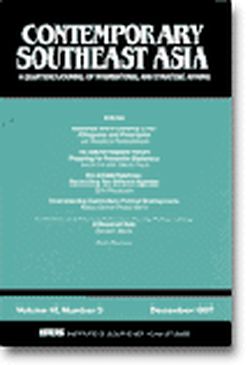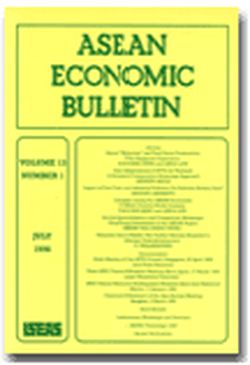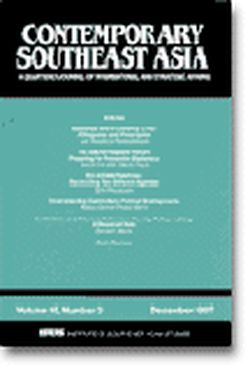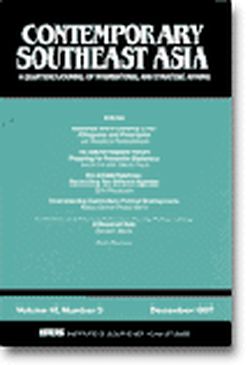Contemporary Southeast Asia: A Journal of International and Strategic Affairs Vol. 17/1 (June 1995)
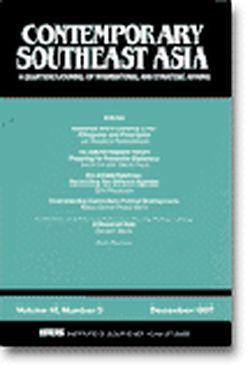
Date of publication:
June 1995
Number of pages:
100
Code:
CS17/1
Contents
-
Preliminary pages
- ARTICLES
-
Terrorism and Secession in the Southern Philippines: The Rise of the Abu Sayaff, by Mark Turner, author see abstractThis article traces the rise of the Abu Sayaff from being an individual letter-writing Islamic preacher to becoming a much feared group of terrorists. Since 1992, the Abu Sayaff has been involved in a sequence of violent incidents, mostly in Western Mindanao but extending as far as Manila. The group's aim is to establish an independent Islamic state in Mindanao. The Abu Sayaff is the latest manifestation of a 300-year-old tradition of armed Muslim opposition to the Philippine state. It has emerged in the context of a deepening of Islam in Mindanao and in areas characterized by poverty, government neglect and state weakness. Precise details of the Abu Sayaff's size, structure and operations are difficult to determine but it has established links with international terrorist groups and has become a significant threat in Western Mindanao.
-
Environmental Security in East Asia, by R T Maddock, author see abstractThreats to security in modern societies lie as much within as without the state. Military security has declined in importance relative to economic and environmental security. Ecological capital is being destroyed on an unprecedented scale. International politics may eventually reflect holistic ecological principles but for now there are no alternatives to the state system. In East Asia, economic progress has been such that in no other area of the world are the imperatives of economic growth and environmental protection on a more direct collision course. Political commitment to improving the environment is increasing but national strategies will not suffice. Because of Joint gains, environmental security will be more expeditiously attained at the regional level. Japan alone has the cognitive model and economic resources to provide environmental leadership.
-
Origins, Sustainability and Lessons from Thailand's Economic Growth, by Chris Dixon, author see abstractBetween 1986 and 1991 Thailand was one of the fastest growing economies in the world. This growth was accompanied by a surge in foreign direct investment, particularly from Japan and the Asian newly industrializing economies (NIEs). Overall, from 1986 Thailand experienced a period of accelerated integration into the global economy. On the basis of these developments, Thailand is not only increasingly referred to as one of the "new" or `"second generation" NIEs, but also presented as providing a new "model" of development. This model has been described as resting on liberalization and the "rolling back of the frontiers of the state", associated with the implementation of structural adjustment. Such a ``deregulation" model of economic growth is very much in tune with the new ``orthodoxy" of development promoted by international agencies and enshrined in World Bank and International Monetary Fund Structural AdJustment Programmes. This article assesses the validity and implications of the ``deregulation" view of Thailand's recent rapid growth through a review of the origins and sustainability of the kingdom's present pattern of growth.
-
Hong Kong's Democratic Challenge, by Jermain Lam, author see abstractThe 1984 Sino-British Joint Declaration stipulates that China will resume sovereignty over Hong Kong in 1997. Yet, democratization in Hong Kong poses a serious challenge to the exercise of Chinese sovereignty. On the one hand, it weakens the Chinese leadership on the island and, on the other, it threatens the communist regime on the mainland. Mutual distrust between the leaders of China and Hong Kong will certainly retard or even kill the development of democracy. Mutual restraint could perhaps provide a chance for democracy to develop in Hong Kong. This means that China has to restrain itself from exercising too much control over Hong Kong in exchange for economic prosperity. By the same token, Hong Kong has to restrain itself from influencing the political affairs of the communist regime on the mainland in exchange for gradual democratization in Hong Kong. In the political context of Hong Kong, rapid democratization seems to be impossible. Rather, the path for democratization in Hong Kong will be slow and characterized by occasional conflicts between Hong Kong and its future sovereign master.
-
China's Defence Modernization: Implications for Asia-Pacific Security, by Jing-Dong Yuan, author see abstractRecent discussions of post-Cold War Asia-Pacific security have focused on China's defence modernization as constituting a maJor source of regional instability. It has been suggested that China's military build-up might upset the region's strategic balance, touching off an arms race, and increasing the likelihood of force being used to resolve territorial disputes over the Spratly Islands. This article argues that alarm about the ``China threat" tends to overestimate the significance of China's recent acquisitions of Russian weaponry and fails to take into account internal and external factors that constrain the pace and scope of Chinese defence modernization.
-
The Many Faces of UNTAC: A Review Article, by Jamie F Metzl, author
- BOOK REVIEWS
-
BOOK REVIEW: Language and Power: Exploring Political Cultures in Indonesia by Benedict R. O'G Anderson, by Leonard C Sebastian, author

